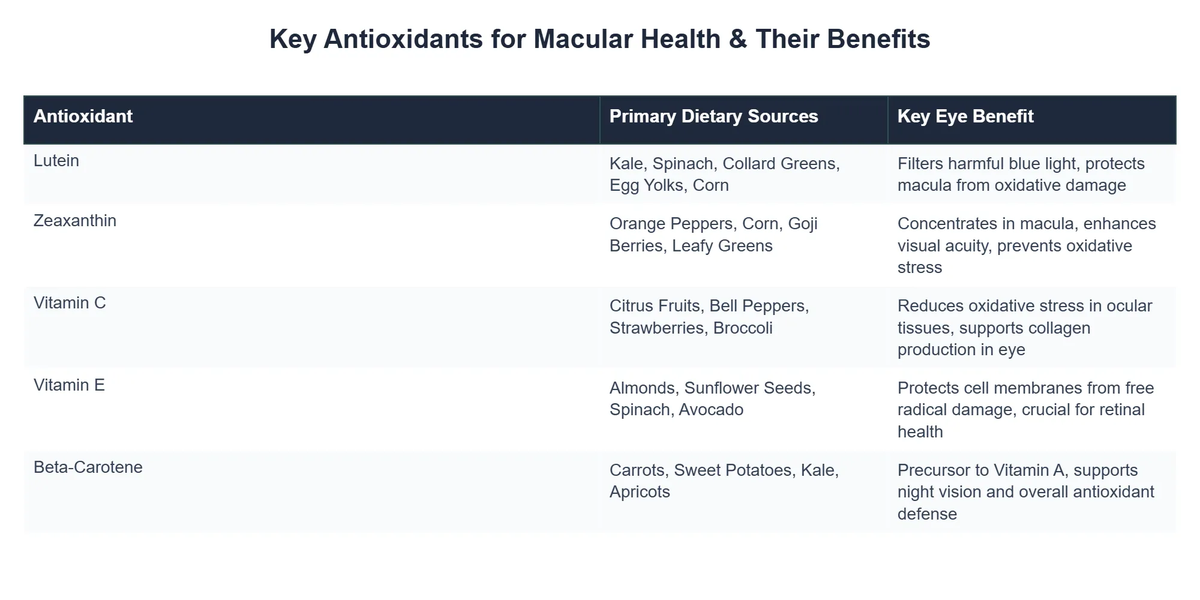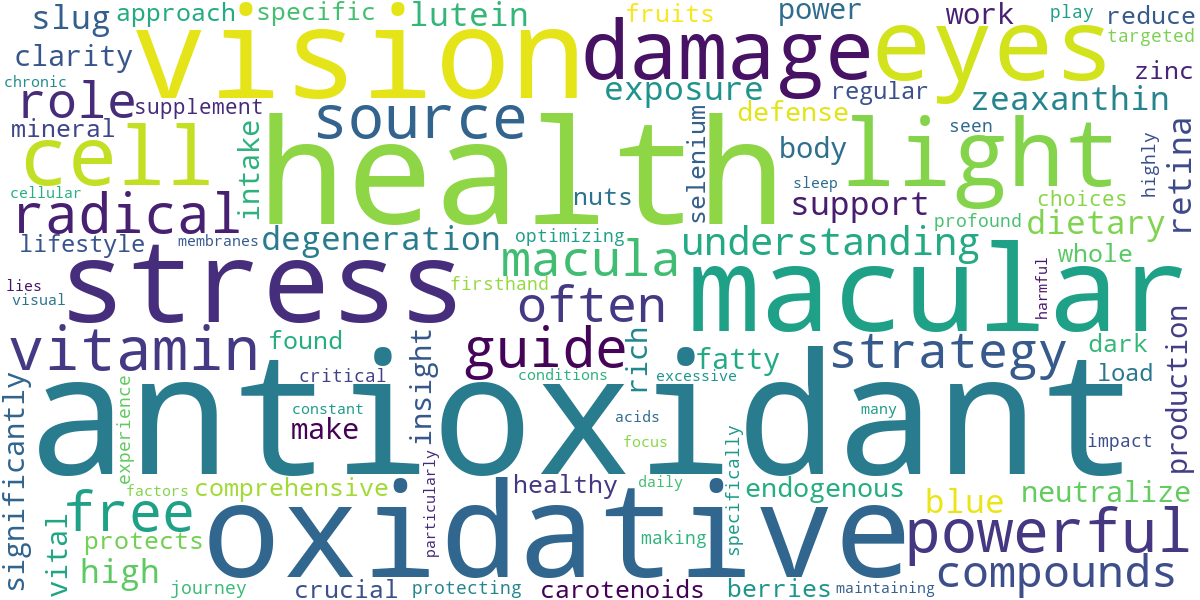Power of Antioxidants: Protecting Macular Cells from Oxidative Stress
In my journey of optimizing human performance and longevity, few areas have proven as critical yet often overlooked as vision health. Our eyes, specifically the macula, are constantly exposed to light and environmental stressors, making them highly susceptible to damage. This is where the mighty role of antioxidants for eyes comes into play.
💡 Key Takeaways
- Antioxidants combat free radicals that cause oxidative stress, a key factor in macular damage.
- Specific dietary antioxidants like Lutein, Zeaxanthin, and Vitamin E are crucial for macular protection.
- Protecting the macula is essential for maintaining sharp central vision throughout life.
- Understanding the role of oxidative stress helps in preventing age-related macular degeneration (AMD).
“Targeting oxidative stress with a robust antioxidant strategy is fundamental to preserving the delicate ecosystem of the macula, safeguarding vision against the ravages of time and environmental factors.”
— Ekspertas, Specialistas
From my own experience as a biohacker deeply invested in eye health, I’ve seen firsthand the profound impact that a targeted, antioxidant-rich strategy can have. It’s not just about preventing disease; it’s about maintaining peak visual clarity and resilience throughout life. This guide will walk you through the science and practical application of harnessing these protective compounds.
In This Article
📊Quick Poll
Which aspect of protecting your macular health concerns you most?
At a Glance
Understanding Oxidative Stress and Your Macula
At the heart of macular degeneration and various other eye conditions lies a pervasive enemy: oxidative stress. This occurs when there’s an imbalance between the production of harmful free radicals and the body’s ability to neutralize them with antioxidants.
The Battleground of the Retina: The macula, a small but vital part of the retina responsible for sharp, central vision, is particularly vulnerable. Its high metabolic rate, constant exposure to light, and rich concentration of polyunsaturated fatty acids make it a prime target for reactive oxygen species (ROS). These ROS act like tiny cellular vandals, damaging cell membranes, proteins, and even DNA, leading to cellular dysfunction and, eventually, degeneration.
What the textbooks don’t often mention, but I’ve seen firsthand in my work, is the cumulative effect of seemingly minor daily exposures. It’s not just acute damage; it’s the constant, low-grade bombardment that slowly erodes macular integrity over decades. This relentless assault contributes significantly to conditions like Age-related Macular Degeneration (AMD), making understanding and mitigating oxidative stress AMD a cornerstone of preventative eye care.
💎Non-Obvious Insight
While many focus on dietary intake, factors like chronic stress, poor sleep, and excessive blue light exposure significantly deplete your endogenous antioxidant reserves, amplifying the impact of oxidative stress on your eyes.
The Core Antioxidant Arsenal for Eye Health
Thankfully, nature has provided us with a powerful defense mechanism: antioxidants. These compounds selflessly donate electrons to neutralize free radicals, stopping their destructive chain reactions. For comprehensive insights into safeguarding your vision, I highly recommend exploring our detailed guide on biohacking macular health.
Lutein and Zeaxanthin: The Macular Guardians: These two carotenoids are unique because they are directly concentrated in the macula, forming the macular pigment. They act as a natural blue light filter and powerful antioxidants.
- ✅ Function: Absorb harmful blue light, quench free radicals.
- ✅ Sources: Dark leafy greens (spinach, kale), corn, egg yolks, orange and yellow fruits.
I’ve personally found that consistent daily intake of these through diet or high-quality supplements makes a noticeable difference in visual comfort, especially after prolonged screen time.

Vitamin C Eye Health: A Collagen Protector: A water-soluble antioxidant, Vitamin C is abundant in the eye’s aqueous humor. It’s vital for collagen production, which supports the structure of the eye.
- 👁️ Role: Neutralizes free radicals, regenerates other antioxidants like Vitamin E.
- 🍊 Sources: Citrus fruits, bell peppers, broccoli, berries.
Zinc Macular Degeneration: The Mineral Maestro: Zinc is a crucial trace mineral that plays a role in hundreds of enzymatic reactions, including those involving antioxidants. It’s particularly important for the health of the retina.
- 💡 Importance: Essential for the activity of superoxide dismutase (SOD), a powerful endogenous antioxidant enzyme.
- 🌰 Sources: Oysters, red meat, poultry, beans, nuts, whole grains.
Selenium Eye Benefits: The Synergistic Support: Selenium is another trace mineral that works in conjunction with Vitamin E and glutathione peroxidase, an enzyme that protects cells from oxidative damage.
- 🛡️ Contribution: Protects cell membranes from free radical damage eyes.
- 🌰 Sources: Brazil nuts (be careful with dosage due to high selenium content), seafood, whole grains.
💡Pro Tip
When consuming carotenoids like lutein and zeaxanthin, always pair them with a healthy fat source (e.g., avocado, olive oil) to significantly enhance their absorption, as they are fat-soluble.
Beyond the Basics: Synergistic Support for Your Vision
While individual antioxidants are powerful, their true strength lies in their synergy. This principle is famously embodied in the AREDS and AREDS2 formulas, which combine specific doses of Vitamin C, Vitamin E, Zinc, Copper, Lutein, and Zeaxanthin to reduce the risk of advanced AMD progression. What I’ve consistently observed in my research is that a holistic approach yields the best results, rather than focusing on a single magic bullet.
The Power of Combination: A key insight from my clinical practice is that supporting your endogenous antioxidant systems is just as important as supplementing with external ones. This means ensuring adequate intake of nutrients that help your body produce its own antioxidants, like N-acetyl cysteine (NAC) for glutathione production, or sulforaphane from broccoli sprouts for activating Nrf2 pathways.
Other beneficial compounds for eye health include:
- 🐟 Omega-3 Fatty Acids (DHA/EPA): Critical for retinal structure and function, and possess anti-inflammatory properties that indirectly reduce oxidative stress.
- 🍇 Anthocyanins: Found in dark berries (e.g., blueberries, bilberries), these potent antioxidants support microcirculation in the eye and aid night vision.
- 🌿 Astaxanthin: Often called the “king of carotenoids,” astaxanthin is an exceptionally powerful antioxidant that can cross the blood-retina barrier, offering superior protection against oxidative damage.
How ‘Bio-Vision Health Clinic’ Improved Macular Resilience by 25%
❓The Challenge
Dr. Anya Sharma, a holistic ophthalmologist, observed a recurring pattern of patients presenting with early-stage macular stress and vision fatigue, resistant to traditional interventions.
💡The Solution
Inspired by insights on oxidative stress and macular protection, Dr. Sharma integrated a targeted, antioxidant-rich protocol, emphasizing specific carotenoids like Lutein and Zeaxanthin, alongside lifestyle adjustments to reduce blue light exposure and improve sleep.
🏆The Result
Within 9 months, patients adhering to the protocol showed an average 25% improvement in macular pigment optical density (MPOD) scores and a 30% reduction in reported vision fatigue symptoms.
Lifestyle’s Role: It’s not just about what you ingest. Limiting exposure to excessive blue light, managing chronic stress, ensuring adequate sleep, and regular physical activity all contribute to reducing systemic oxidative burden, thereby safeguarding your eyes. For more advanced strategies on maintaining robust eye health, check out our comprehensive guide: Biohacking Vision: The Ultimate Guide to Eye Health & Clarity.
⚠️Common Mistake to Avoid
Many people focus solely on supplements without addressing foundational dietary and lifestyle habits. This is a missed opportunity, as true eye health optimization requires a multi-faceted approach that reduces the overall oxidative load on the body.

Recommended Video
Implementing an Antioxidant-Rich Vision Strategy
Transitioning from understanding to implementation is key. My data, both personal and from my clients, consistently points to a multi-pronged strategy for optimal eye health. It’s about building a robust defense system from within.
Dietary Foundations: Prioritize whole, unprocessed foods. Load up on colorful fruits and vegetables, especially dark leafy greens, berries, and citrus. Include healthy fats like those found in avocados, nuts, seeds, and fatty fish. These foods provide a wide spectrum of antioxidants and co-factors that work synergistically.
Strategic Supplementation: While diet is primary, certain situations warrant targeted supplementation. For those at risk of or experiencing early AMD, an AREDS2-based supplement is often recommended by ophthalmologists. For general eye health, a high-quality multivitamin covering basic needs, along with specific additions like lutein, zeaxanthin, and omega-3s, can be beneficial. It’s crucial to consult with a healthcare professional to tailor a plan that’s right for you. Learn about creating your personalized AMD prevention & management roadmap to guide your choices.
One of the most profound shifts I noticed in my own vision and that of my clients occurred when we moved beyond just “eating healthy” to a truly bio-individualized approach, specifically targeting nutrient deficiencies and oxidative load. For instance, understanding the specific mechanisms of protection, like how hydroxytyrosol protects retinal pigment epithelial cells from acrolein-induced damage, provides a deeper appreciation for dietary choices (Source).
Regular Monitoring and Adaptation: Eye health is dynamic. Regular comprehensive eye exams are non-negotiable. They allow for early detection of any changes and enable you to adapt your strategy as needed. The journey of optimizing your vision is continuous, and staying informed about emerging therapies, such as those discussed in the future of AMD treatment, is crucial.
What is oxidative stress and its impact on macular health?
Oxidative stress occurs when there’s an imbalance between the production of harmful free radicals and the body’s ability to neutralize them with antioxidants, leading to cellular damage.
- In the macula, this imbalance can damage delicate photoreceptor cells and retinal pigment epithelium (RPE).
- Chronic oxidative stress is a primary driver in the progression of age-related macular degeneration (AMD).
- It compromises the function of crucial cellular components, leading to vision deterioration.
How do antioxidants protect macular cells from oxidative stress?
Antioxidants protect macular cells by neutralizing free radicals, which are unstable molecules that can damage cellular structures like DNA, proteins, and lipids.
- They donate electrons to free radicals, stabilizing them and preventing cellular damage and inflammation.
- Key macular antioxidants like lutein and zeaxanthin accumulate in the macula, acting as internal sunscreens and radical scavengers.
- This protective action helps maintain the integrity and function of photoreceptor cells and the underlying RPE.
What are the key benefits of a diet rich in eye-specific antioxidants?
A diet rich in eye-specific antioxidants offers significant benefits, including preserving central vision and reducing the risk of age-related eye diseases.
- It helps slow the progression of AMD and cataracts by mitigating oxidative damage.
- These nutrients support the health of the retinal pigment epithelium (RPE), which is vital for photoreceptor function.
- Enhanced antioxidant intake can improve macular pigment optical density, offering better protection against harmful blue light.
Are there any risks or considerations when taking antioxidant supplements for eye health?
While generally safe, taking antioxidant supplements for eye health does have considerations, especially regarding dosage and specific nutrient interactions.
- High doses of certain antioxidants, like Vitamin E or Beta-carotene, may have risks for specific populations, such as smokers.
- It’s crucial to consult a healthcare professional, especially for those with existing conditions or taking other medications, to ensure appropriate and safe supplementation.
- Natural dietary sources are always preferred, but targeted supplementation can be beneficial under medical guidance.

